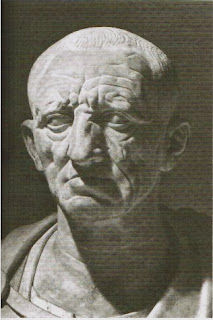Worldbuilder’s Disease
Mitch Hedberg once said, "Alcoholism is a disease, but it's the only one you can get yelled at for having." Well, there's also Worldbuilder's Disease and I'm going to yell at you right now for having it - the simple truth is NO ONE CARES!Worldbuilder's......
Thinking About Writing
Writing is hard.Ordering your thoughts into coherent and effective wording, with well-paced and enjoyable clarity is not an easy thing. There are those for whom it comes to more naturally, of course, but I'm not sure if I'm one of those people. I edit ......
Breaking News: Britain Chooses Picture as Leader
British voters yesterday chose a print of a late-nineteenth-century oil painting to lead their country for the foreseeable future.
The picture shows a white family at a table drinking tea. A portrait of Queen Victoria hangs on the wall. Golden-tinged sunlight streams in from a window, through which a...
The wisdom of Cato the Elder
The Roman senator Cato the Elder was not a very nice man. When he was young he fought in the Second Punic War against Carthage. The war devastated Italy, and Rome was nearly defeated. But it finally prevailed and imposed a peace treaty...
Block, Apathy and Distractions Part 2: Getting Over It
In this post I’m going to talk about some of the things that have helped me and continue to help me push forward and continue writing when I feel blocked, apathetic or distracted. These are things that in my personal experience have helped me when I have been stuck...
